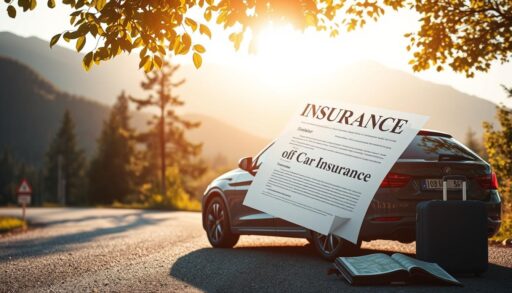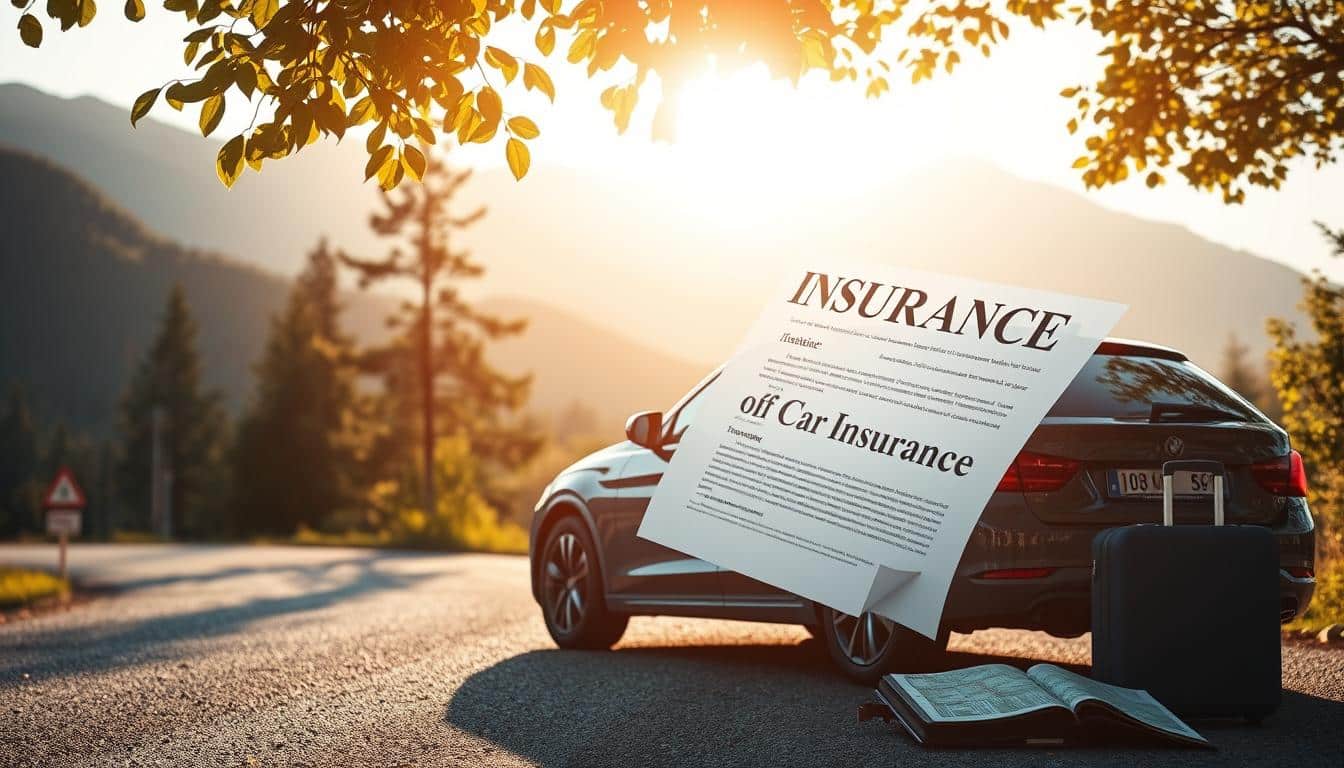Travel Car insurance is key for unexpected events like trip cancellations, medical emergencies, lost luggage, and flight delays. It’s important to know what your policy covers and what it doesn’t. Rental car insurance, offered by car rental companies, also has its own exclusions. These can affect your financial responsibility if the car is damaged, stolen, or involved in an accident.
The cost of travel insurance varies, from 4% to 6% of your trip’s total cost, says Forbes Advisor. Rental car insurance options like Collision Damage Waiver (CDW), Liability Insurance, Personal Accident Insurance (PAI), and Personal Effects Coverage (PEC) also have exclusions. Knowing these can help you avoid unexpected costs when renting a car.
Key Takeaways
- Travel insurance policies often have exclusions that limit coverage in certain situations.
- Rental car insurance also comes with its own set of exclusions that can impact your financial liability.
- Understanding the details of your travel insurance and rental car coverage is crucial to ensuring adequate protection during your trip.
- Leaving belongings unattended, failing to disclose pre-existing medical conditions, and engaging in reckless behavior can lead to denied claims.
- Carefully reviewing your policy and coverage options can help you make an informed decision when choosing the right travel insurance and rental car protection.
Understanding Travel Car Insurance
Renting a car can make exploring easier, but it also has risks. Travel car insurance protects against damage, theft, or accidents. It offers coverage like Collision Damage Waiver (CDW) and Liability Insurance.
What is Travel Car Insurance?
Travel car insurance covers you when renting a car. It helps pay for repairs or replacement if there’s an accident. This insurance is crucial when traveling abroad, as dealing with accidents can be tough without it.
Importance of Travel Car Insurance
Renting a car on vacation gives you freedom but also risks. Travel car insurance protects you from financial loss in case of an accident. It’s especially useful when traveling to new places, as your personal insurance might not cover rental cars abroad.
| Coverage Type | Potential Cost |
|---|---|
| Collision Damage Waiver (CDW) | $10-$30 per day |
| Liability Insurance | $10-$15 per day |
| Personal Accident Insurance (PAI) | $5-$10 per day |
| Personal Effects Coverage (PEC) | $5-$10 per day |
Adding all rental car insurance coverages can cost around $30 per day. But, many people already have some of these protections. This means you might not need to buy extra coverage from the rental agency.
Common Exclusions in Travel Car Insurance Policies
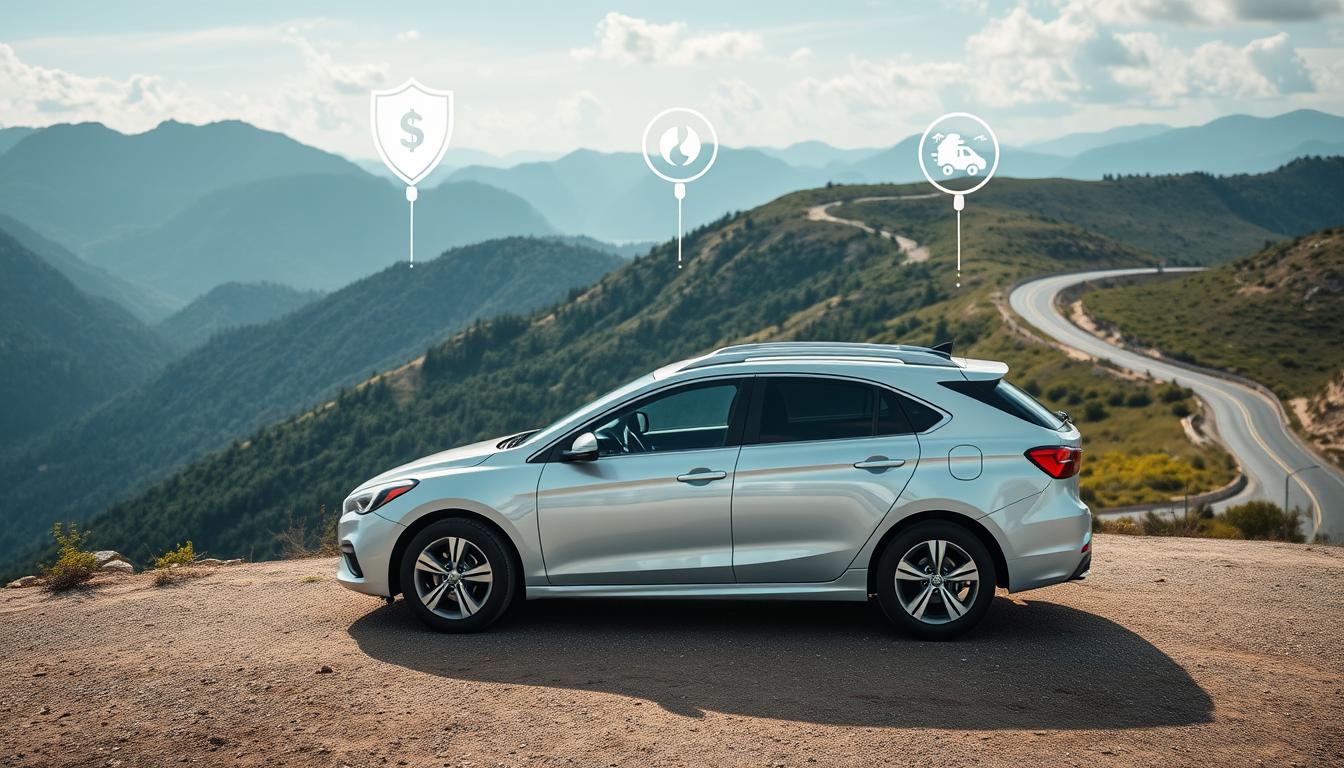
Travel car insurance has exclusions that can stop you from getting a claim. These exclusions differ by policy. But, there are a few main areas to know about.
Leaving Belongings Unattended
Leaving your belongings unattended or in an insecure spot is a common exclusion. If your valuables are stolen from the rental car while you’re away, your claim might be denied. Always keep your items with you or safely locked in the car.
Pre-existing Medical Conditions
Not telling about pre-existing medical conditions or traveling against doctor’s advice can lead to a denied claim. Be honest about your health when buying travel car insurance. This ensures you’re fully covered.
Reckless Behavior and Illegal Activities
Doing reckless things like drinking too much, using drugs, or taking part in risky sports can deny your claim. Also, breaking driving rules, like driving on unpaved roads or letting someone else drive, can void your insurance.
Knowing these exclusions helps you choose the right travel car insurance. It gives you peace of mind and the coverage you need while traveling.
| Exclusion Type | Typical Rate of Occurrence |
|---|---|
| Claims resulting from contractual obligations | Up to 5% of policies |
| Damages caused by driving under the influence | Approximately 10% of policies |
| Normal wear and tear exclusions | Around 20% of policies |
| Damages caused by unauthorized drivers | About 8% of policies |
| Damages caused by war, invasion, or similar events | Nearly all comprehensive policies |
“Understanding the list of exclusions can help policyholders save both time and energy, reducing unnecessary claim submissions by up to 25%.”
Travel Car Insurance
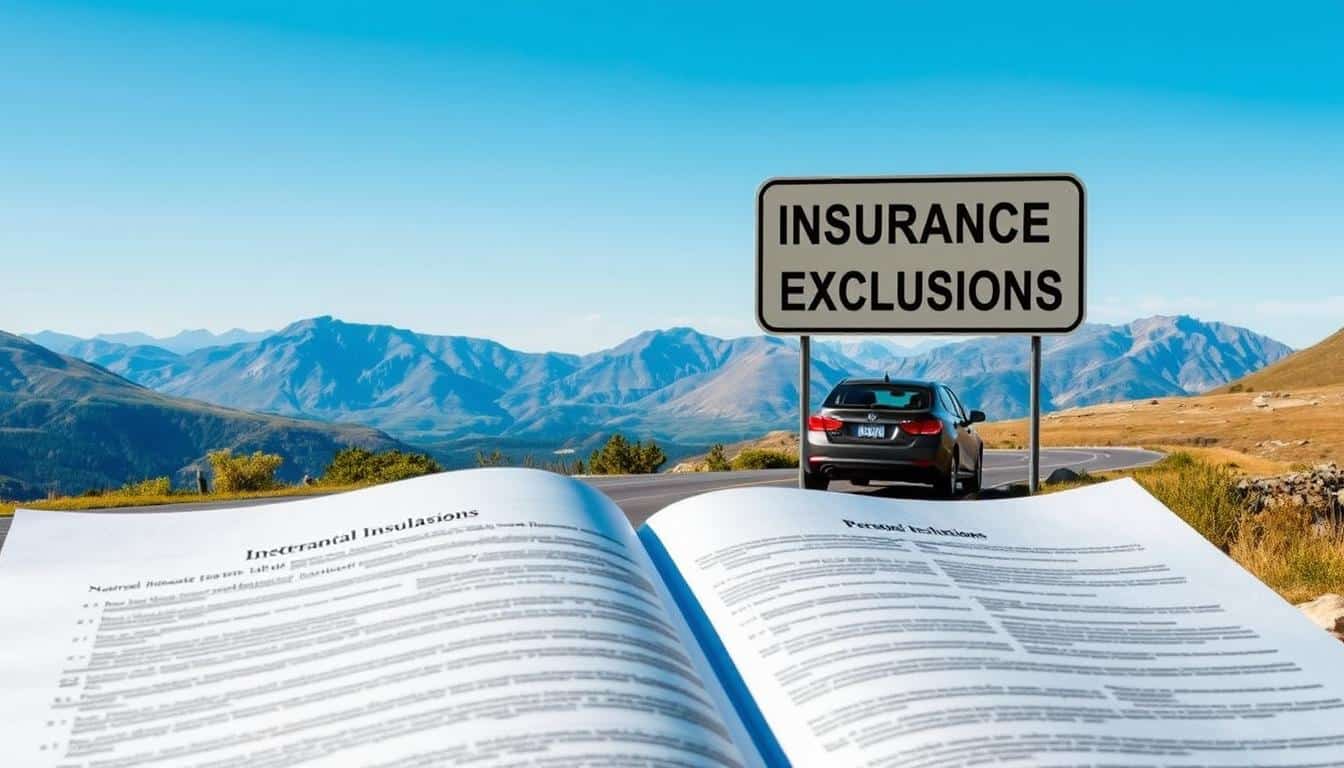
Travel car insurance, also known as rental car insurance, is an optional coverage. It’s offered by rental car companies to protect renters from financial loss. This includes damage, theft, or accidents with the rental vehicle. It offers peace of mind, especially when renting a car abroad or on a road trip in the U.S.
Rental car insurance policies include various coverage options. These are Collision Damage Waiver (CDW), Liability Insurance, Personal Accident Insurance (PAI), and Personal Effects Coverage (PEC). This insurance makes the claims process easier, helps with repairs, and protects you from high costs in case of an incident.
- Collision Damage Waiver (CDW) covers the cost of repairing or replacing the rental car if it is damaged or stolen.
- Liability Insurance provides coverage for injuries or property damage to others if you are found at fault in an accident.
- Personal Accident Insurance (PAI) covers medical expenses for you and your passengers if someone is injured in an accident.
- Personal Effects Coverage (PEC) protects your personal belongings stored in the rental car from theft or damage.
Many personal auto insurance policies and credit card benefits offer some coverage for rental cars. But the level of protection can vary. Buying a dedicated travel car insurance plan ensures you have the right coverage. This minimizes the risk of unexpected costs during your trip.
“Having travel car insurance can give you the peace of mind and protection you need when renting a vehicle, especially in an unfamiliar destination.”
In summary, travel car insurance is a valuable investment. It provides comprehensive coverage and simplifies the rental process. This way, you can enjoy your journey without worrying about financial liabilities.
Factors to Consider When Choosing Travel Car Insurance
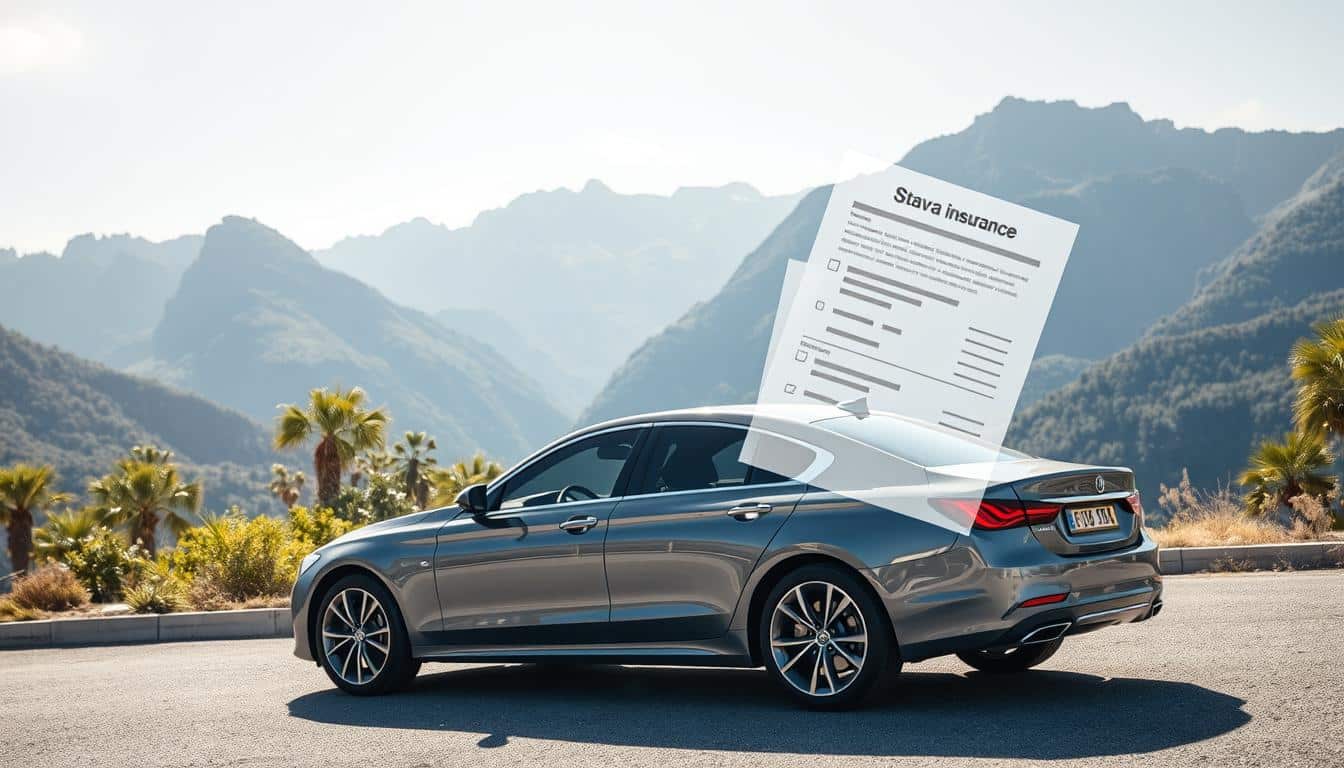
When picking a travel car insurance plan, several key factors come into play. The cost of insurance is a big deal, as it changes based on how long you rent, the car type, and how much coverage you want. It’s important to think about how much you might have to pay out of pocket if there’s an accident without enough insurance.
Another important thing is how much coverage you need. This depends on where you’ll be driving, how you drive, and the rental car’s value. Knowing what’s not covered, like off-road driving or reckless damage, is also key to make sure the coverage fits your needs.
Cost of Insurance
The price of travel car insurance varies. It can be an extra $10-$20 a day for a Collision Damage Waiver (CDW) or $7-$14 a day for Liability Insurance. Personal Accident Insurance costs $1-$5 a day, and Personal Effects Coverage is $2-$5 a day. Remember, making a claim might raise your rates later.
Extent of Coverage Needed
The right amount of coverage for your travel car insurance depends on a few things. Think about where you’ll be driving, how you drive, and the rental car’s value. Some policies don’t cover off-road driving or damages from reckless behavior, so it’s important to check the policy details.
Travel insurance also covers trip delays, cancellations, or interruptions, and protects your personal belongings. It includes emergency medical care and evacuation coverage too.
When choosing travel car insurance, weigh the cost, coverage, and what’s not covered. This ensures you have the peace of mind and protection you need for your trip.
Alternatives to Travel Car Insurance

When you rent a car, you might not need to rely only on the rental company’s insurance. Your own auto insurance might cover rental cars, but the details can vary. Many credit cards also offer rental car insurance, which could be a good alternative.
It’s key to check the fine print of your credit card’s rental car coverage. There might be limits on the vehicles, how long you can use it, or what’s not covered. Knowing what your auto insurance and credit card offer can help you decide if you need more insurance.
Another choice is to buy a rental car insurance policy from a third-party. Companies like Allianz Global Assistance and Bonzah offer plans that cover damage, theft, and liability. The cost and what’s covered can differ, so it’s smart to compare plans.
When looking at different insurance options, think about the coverage limits, deductibles, and what’s not included. By looking at your auto insurance, credit card benefits, and third-party plans, you can choose the best coverage for your rental car needs.
“Carefully reviewing your insurance options can provide valuable peace of mind when renting a car during your travels.”
Also Read : What Are The Security Features Of Travel Debit Card?
Conclusion
When you rent a car for travel, knowing about travel car insurance is key. It helps protect you from unexpected costs. But, some things aren’t covered, like leaving things unattended or not telling about health issues beforehand.
It’s smart to check your policy well and look at other insurance options. This way, you can travel without worry. You’ll know you’re safe if something goes wrong.
Rental car insurance usually covers damage, theft, and accidents with others. But, it doesn’t cover wear and tear or pre-existing car issues. You might need extra insurance for certain trips or items.
Being well-informed about travel car insurance can save you money and stress. It’s all about making smart choices to keep you safe on your travels.
FAQs
Q: What are the common exclusions in rental car insurance policies?
A: Common exclusions in rental car insurance policies often include damage to the vehicle due to reckless driving, driving under the influence, or not adhering to the rental agreement. Additionally, many policies exclude coverage for personal belongings, tire damage, and certain types of off-road driving.
Q: Does personal car insurance cover rental cars?
A: Yes, personal car insurance may extend to cover rental cars, but it depends on the specific terms of your policy. It’s essential to check with your insurance provider to understand whether your personal car insurance provides adequate rental car coverage.
Q: What should I consider when buying rental car insurance?
A: When buying rental car insurance, consider the types of coverage offered, such as collision damage waiver, liability coverage, and personal accident insurance. Additionally, evaluate whether your personal car insurance or travel insurance plan already includes these coverages to avoid unnecessary duplication.
Q: Is rental car insurance necessary if I have travel insurance?
A: It depends on the specifics of your travel insurance plan. Some travel insurance plans include rental car insurance coverage, while others do not. Review your travel insurance policy carefully to determine if you need to purchase additional rental car insurance.
Q: Can I get rental car insurance through credit cards?
A: Yes, many credit cards offer rental car insurance coverage as a benefit, provided you use the card to pay for the rental. However, coverage varies by card, so it’s important to check the terms and conditions to understand what is included.
Q: What is the difference between primary and secondary rental car insurance coverage?
A: Primary rental car insurance coverage pays for damages before any other insurance plans kick in, while secondary coverage only provides protection after your personal car insurance has been exhausted. Understanding which coverage applies can help you choose the best option for your needs.
Q: What happens if I damage a rental car while traveling?
A: If you damage a rental car while traveling, you will typically be responsible for covering the costs of repairs. Depending on your rental car insurance coverage, you might be able to claim these costs through your rental car insurance or your personal car insurance plan.
Q: How does travel insurance with rental car coverage work?
A: Travel insurance with rental car coverage protects you against financial loss in case of accidents, theft, or damage to the rental vehicle. It is crucial to read the policy details to understand what is covered and any exclusions that may apply before you rent a car.
Q: Can I extend my personal car insurance to cover a rental vehicle?
A: Yes, many personal car insurance policies allow you to extend coverage to a rental vehicle. However, you should confirm this with your insurance agent to ensure you have the right level of protection while renting a car.
Q: How can I get peace of mind while renting a car?
A: To achieve peace of mind while renting a car, consider purchasing rental car insurance, reviewing your personal car insurance policy for coverage, and utilizing credit card benefits. Additionally, understanding the rental agreement and ensuring that you have a good travel insurance plan can further enhance your security while traveling.

